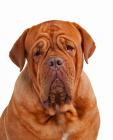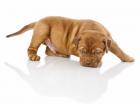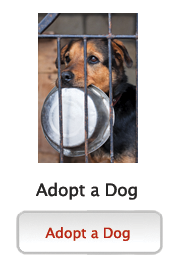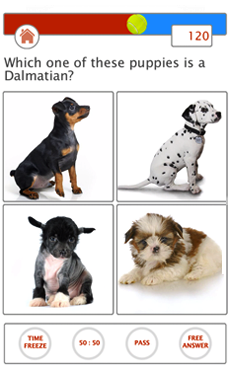Dogue de Bordeaux
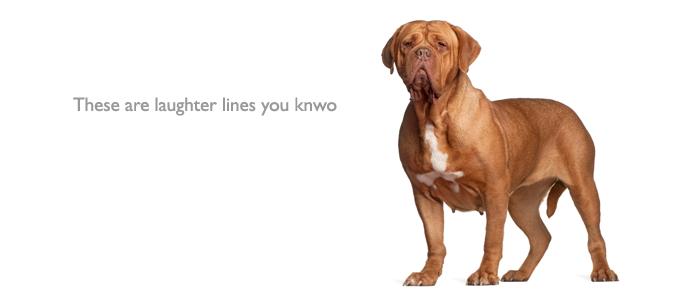
In my own words
Please Monsieur, do not be fooled, I may appear like a fearsome hound but I am even-keeled and ever so sweet to my family. I need ample amounts of attention and affection. Give me a cuddle and a belly rub any day. My baggy skin is always good for a tug. Lounging on the sofa sounds like heaven to my floppy ears. However, sometimes I have been described as having a split personality. I can’t help how I am, whilst I am very calm and gentle at points there are also moments where I can turn extremely protective and dominant at others. My owner is so helpful he has given me consistent and gentle training since I was a petit pup. I needed his firm leadership, whilst keeping kind and calm. It’s also important that I have a lot of room, as I’m a beast of a dog, he’s always very cautious when we cuddle. All breakables are kept at safe distances. Historically, my breed was bred in several different regions of France where we were valued as hunters, guard dogs and companions by both the aristocracy and working class. To this day I’m still used as a guard and watch dog.
My ideal owner(s)
Families with older children
Experienced dog handlers
Couch potatoes
What they say about me
Affectionate
Relaxed
Protective
Distinguished
Courageous
Patient
Please read on, to find out more about me, and whether I will be someone you can be happy with for the next 12 years, or even longer!
Is this Dogue de Bordeaux for you?
Test your knowledge about the Dogue de Bordeaux
Information essential about the Dogue de Bordeaux
Kennel Club Group:
Breed Group: Working
Category:
Mastiff
Size:
Height: 23-30 inches (58-75cm) Weight: 120-145 pounds (54.4-65.2kg)
Popularity:
It suffered a drop in popularity after World War II, but increased its numbers during the 1960s. With the help of Dogue de Bordeaux clubs, it continues to thrive in the U.S. and Europe.
Breed History:
There are numerous theories about the origin the Dogue de Bordeaux. It may be descended from the Bulldog, Tibetan Mastiff and from the Greek and Roman Molossus, from mastiffs brought to Europe by the Alans, from the dogs of Aquitaine or from Spanish dogs from Burgos. At the end of the middle ages, the dog was used as a cattle driver and personal bodyguard. Lots of Dogues died during the French Revolution. After the war numbers rose again. Raymond Triquet and his French Dogue de Bordeaux Club saved the breed. The Dogue de Bordeaux is now thoroughly established in France and gaining popularity in other countries. The breed has served as a war dog, flock guardian, cattle herder, guard dog, trained to bait bulls, bears, and jaguars, and a hunter of boars. The breed was recognised by the American Kennel Club in 2008.
Character:
On a typical day, you’ll find your Dogue snoozing on its favourite couch or bed. And it won’t be hard to locate: Just follow the snoring sounds. The Dogue may not be up for a big run in the park, but it does appreciate vigorous daily walks. Though somewhat mellow and easygoing around the house, the Dogue can be very protective of its family and environment. It makes a very effective watchdog—often by just standing there—and knows when and how to adjust the intensity. The Dogue has a calm self-assurance in almost every situation.
The Dogue de Bordeaux is gentle around its family, but needs plenty of socialization around other animals. It has a strong sense of independence—not to mention a loyalty to family—that will benefit from fine-tuning.
Temperament:
The Bordeaux has a good and calm temperament. It is extremely loyal, patient and devoted to his family. Fearless and confrontational with strangers, he is a first class watch and guard dog. They socialize very well with other animals, preferably starting from an early age to avoid them being aggressive with other dogs. The Dogue de Bordeaux snores and drools. Despite his fearsome appearance, the Dogue de Bordeaux is gentle with children and family members. However this is a powerful animal, and is not suitable for an inexperienced dog owner. The objective in training this dog is to achieve a pack leader status. It is a natural instinct for a dog to have an order in their pack. When we humans live with dogs, we become their pack. The entire pack cooperates under a single leader. Lines are clearly defined and rules are set. You and all other humans MUST be higher up in the order than the dog. That is the only way your relationship can be a success. This breed needs a calm, but firm owner who displays a natural authority over the dog. This breed, if male, should not be placed in a home with another male. A powerful breed, the Dogue De Bordeaux does well with children but should always be supervised. This breed must be socialized well at an early age to avoid any aggressive problems in the future. Overall, this dog is not for the inexperienced.
Conformation:
The Dogue de Bordeaux also called the French Mastiff and sometimes called the Bordeaux Bulldog is a relatively short, stocky mastiff. The wrinkled head is massive, heavy and broad. Males can have a head circumference of 27-30 inches (68-75cm). The muzzle is somewhat short (1/3 the total length of the head), wide, powerful and thick, with a pronounced stop. The nose is large with wide-open nostrils. Colour depends on the mask of the dog. The teeth meet in an under bite. The upper lips hang thickly down over the lower jaw. The thick skin on the neck is loose, forming a noticeable dewlap. The eyes are hazel to dark brown depending on the color of the dog and are set wide apart. The ears are small, hanging down, in proportion to the dog and are darker in colour. The tail is thick at the base tapering to a point. The chest is deep, broad reaching lower than the elbows. The legs are muscular. The coat is short and soft with loose fitting skin. Coat colours include various shades of fawn to mahogany with a darker red or black mask around and under the nose including the lips and eye rims. There are sometimes white markings on the chest and tips of the toes.
Colour:
The Dogue de Bordeaux comes in a reddish brown with shades of fawn, from Mahogany to Isabella. Pigmentation is required. White patches on the chest and extremities of the limbs are acceptable
Training:
The Dogue De Bordeaux has average intelligence, yet is very loyal and obedient and eager to please his owner. Requires a dominant trainer to avoid any problems as this is a fearless, large, and courageous breed. Does well in obedience, working, and watch dog sports
Care:
The Dogue de Bordeaux is an average shedder, requiring little to no maintenance. To remove excess hair, brushing with a firm bristle brush would be a good idea, however a wipe down with a dry towel or damp washcloth should be sufficient. He requires little to no coat maintenance.
The Dogue De Bordeaux requires quite a bit of exercise, and would do best with a relatively active owner. A large yard is suggested when considering this breed and long walks would do great. However, the short muzzle can cause this breed to tire out quickly so proper water should always be available.
Health:
. This breed will do okay in an apartment if it is sufficiently exercised. They are very inactive indoors and will do okay without a yard. The healthy Dogue de Bordeaux can live as long as 10 year. In most cases, they produce a small litter size.
You may also like:
Dogue de Bordeauxs looking for a home in UK »

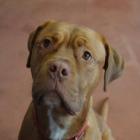
If you like Dogue de Bordeauxs, you may be interested in breeds of the same size »
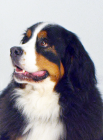
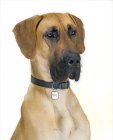
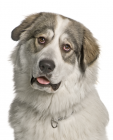
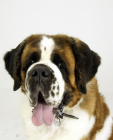

If you like Dogue de Bordeauxs, you may like other breeds with similar characteristics »
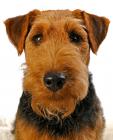
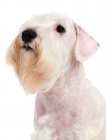
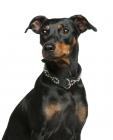

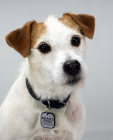
Advice on choosing your breed »
Find an animal shelter or rescue home where a Dogue de Bordeaux is waiting for a new home »
The following grid gives a fast track review, which covers all breeds. You can apply it to help you decide if a Dogue De Bordeaux is suitable for you, the environment where you live, your personality and your lifestyle. On the grid, 1= strongly disagree, and 5= strongly agree. For example, if you are looking for a dog to make a good walking companion, look down the list under Activities, and you will see that Dogue De Bordeaux have lots of energy and are strong walkers, scoring 5. If you want a dog that is good for country living, look under Environment and you will see that Dogue De Bordeaux are suited to country living, scoring 5. You might like to save or print off this section and keep it for reference while you check some other breeds before making your final choice.
Be the first to rate this breed »
|
*PLEASE NOTE: All our breed profiles are general, and all dogs are individuals. Always talk to the breeders and meet the owners you are buying from. Try to meet the dog and its parents if it is a puppy in their home environment.








